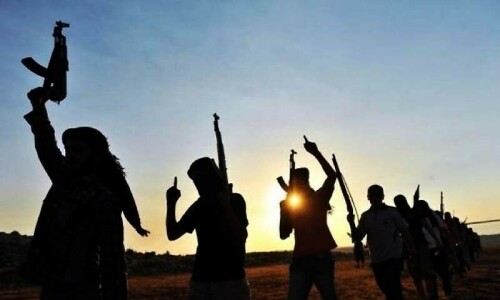
KABUL: Afghan security forces are freeing captured senior Taliban for payment or political motives, with President Hamid Karzai and his powerful brother among those authorising and requesting releases.
The practice is so systemic that the Taliban have a committee focused on getting their fighters out of jail. It undermines the deterrent effect of arrest and the potential of the prisoner population as a card to play in peace talks, analysts say.
The releases, which were confirmed to Reuters by several sources familiar with a range of cases, also raise questions about the capacity and political will of Afghan security forces meant to be taking over from foreign troops starting next year.
US forces will begin drawing down numbers from next July and Nato hopes to meet Karzai’s 2014 target for all security to be provided by Afghan police and military.
But cases uncovered by Reuters including that of Ghulam Haidar, a top insurgent in the southern Taliban heartland of Kandahar, suggest that a web of complex loyalties and widespread corruption are undermining the fight against the insurgency.
Ghulam Haidar, meaning “servant of God”, is a common name in Afghanistan so when Canadian forces turned one of the most dangerous men in Kandahar city over to their Afghan counterparts in March, they may not have realised who he was.
Days later he was walking free again, according to three sources who have investigated prisoner releases or have seen documents about Haidar’s capture. They asked not to be named because they are not authorised to release information.
“They took this guy into custody in mid-March, but he was out again in a few days. This is a classic example of what has been happening,” one former Western official told Reuters.
A Kabul-based source with links to Western intelligence services confirmed Haidar was a Taliban leader known to have a major role in the insurgency around the city.
Yet his freedom was requested by Karzai’s younger brother Ahmad Wali Karzai, head of the Kandahar provincial council.
Dubbed “AWK” by Westerners working in Kandahar, he has an iron grip on the city but his loyalties are considered less solid. A US government cable dated 2009, released by WikiLeaks, described him as a corrupt drug trafficker.
“When Ghulam Haidar was in (Afghan) custody AWK asked for his release,” said a second source, who rejected the idea that Haidar could have been set free because he was a double agent.
“If the Afghan government had good agents within the Taliban things should have gotten better — but that is obviously not the case,” the source added.
Ahmad Wali Karzai said he had never asked for the release of a Taliban prisoner and had not heard of Ghulam Haidar.
“I am the person most wanted by the Taliban, with nine suicide attacks against me,” he told Reuters by telephone.
“I would be the last person to release the Taliban — my position is for more tough measures against them.”
The Defence Ministry and National Directorate of Security, President Karzai’s office and the Nato-led International Security Assistance Force all declined to respond to questions on Ghulam Haidar’s case or the wider issue of Taliban releases.
A spokesman for the Interior Ministry, which controls the police, said it had not been involved in release of any Taliban.
“We have no evidence and no examples that detained Taliban were released by government officials,” Zemarai Bashary said.
Taliban Freedom Committee
Haidar was one of the most high-profile insurgents in recent years to slip through prisoner release mechanisms that are designed to prevent innocent men from languishing in prison but are regularly exploited by the Taliban to free key commanders.
“The Taliban operate a commission for prisoners affairs and effecting releases is among its responsibilities,” said Michael Semple, a Harvard University fellow with over 20 years experience in Afghanistan and extensive contacts with the Taliban.
“It’s systemic. It is well beyond the level of having the occasional success,” he added.
Another source also confirmed the committee’s existence, although in practical terms most release operations were conceived and directed at the local level.
In cases like Ghulam Haidar, political connections are key.
One of the most high-profile examples in recent years was the 2007 release of Dastagir, a Taliban leader from northwestern Badghis province. President Karzai himself ordered the commander freed after village elders promised he would renounce violence.
His return to battle united feuding Taliban factions and he was personally responsible for the deaths of at least 32 Afghan policemen in attacks he organised before he was killed in 2009, said a government source from western Afghanistan.















































Dear visitor, the comments section is undergoing an overhaul and will return soon.